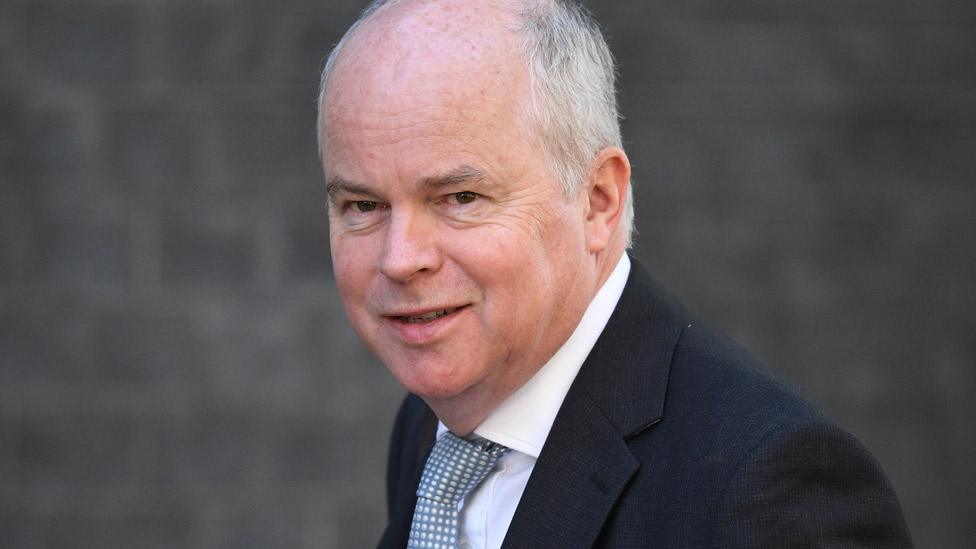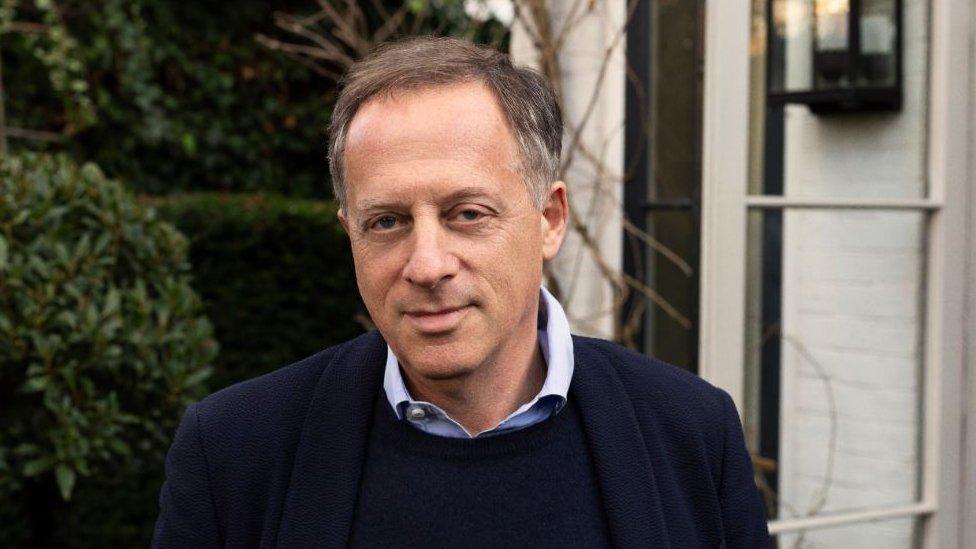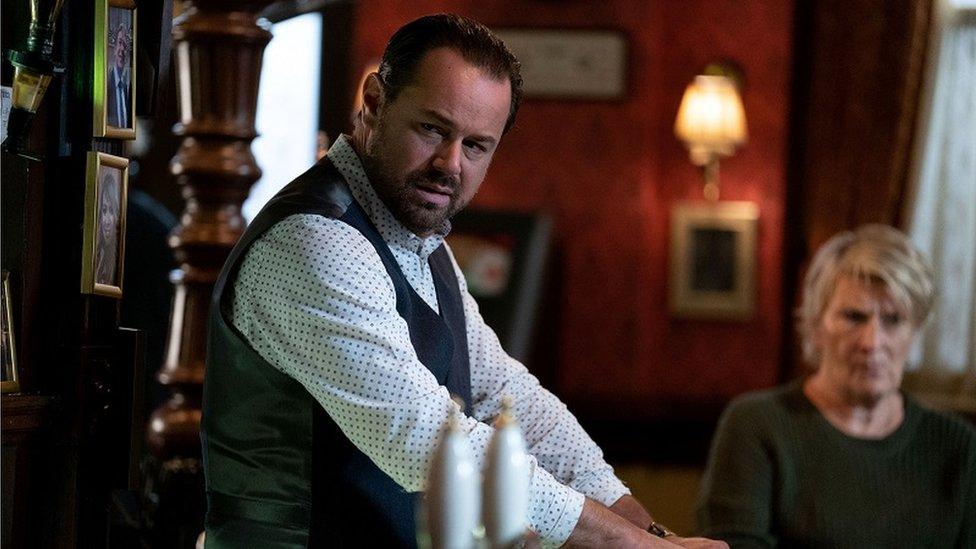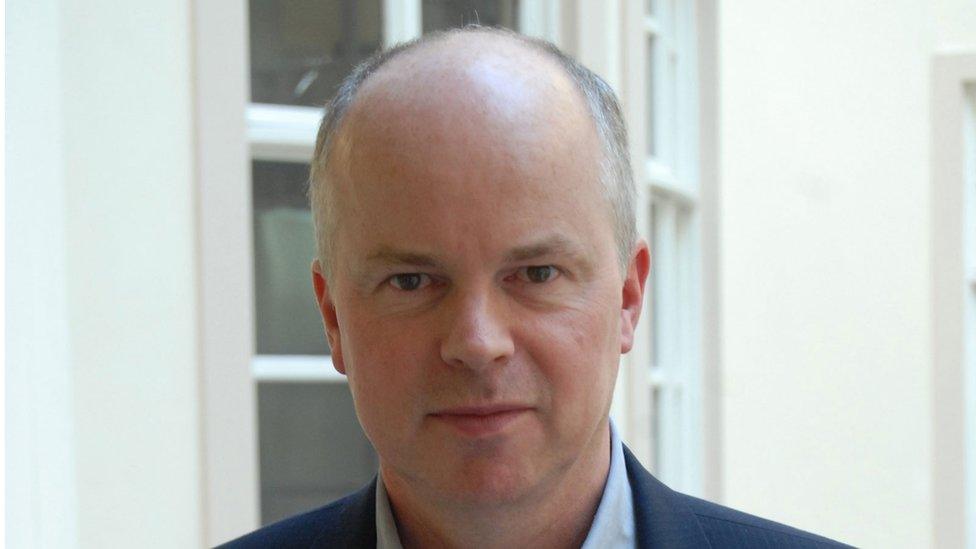Sir Robbie Gibb: Former Downing Street communications director joins BBC Board
- Published

Sir Robbie was director of communications for Prime Minister Theresa May from 2017-19
Sir Robbie Gibb, a former Downing Street communications director, is joining the BBC board as the board member for England. He will start on 7 May.
Prior to working in No 10 for the Conservative Party between 2017 and 2019, Gibb had a successful 25-year career at the BBC, culminating in his role as head of Westminster. Before that, he was deputy editor of Newsnight and editor of The Daily Politics and This Week.
It was in those latter capacities that Gibb worked closely with Andrew Neil, the broadcaster and publisher who is chairman of GB News - a new British news network due to launch in the coming months. Gibb played an important role in the early stages of that project, but stood down as editorial adviser in October.
His main job is working as a senior communications adviser for the consultancy firm Kekst CNC. He is also a director of The Jewish Chronicle. He will continue in these roles.
Gibb was a prominent supporter of Brexit. He was in No 10 during the tumultuous leadership of Theresa May, which was dominated by the effort to secure the UK's departure from the European Union.
Critical Support(er)
Since leaving front-line politics, Gibb has written several articles about impartiality in broadcasting - not least at the BBC.
In one of these articles, he said the election coverage on Radio 4's Today programme was "a masterclass in why the BBC is losing the trust of its audience". He said he thought the programme was "trapped by its own 'woke' group think", and that his friends had dubbed it "Radio Misery".
In an article for The Daily Telegraph, external, he wrote: "The BBC has been culturally captured by the woke-dominated group think of some of its own staff. There is a default left-leaning attitude from a metropolitan workforce mostly drawn from a similar social and economic background..."
In the same piece, he continued: "Almost as soon as Britain's verdict [in the EU referendum] was delivered, the rigorous rules were relaxed and anti-Brexit bias and metropolitan 'group think' crept back into the corporation's coverage."
In another article for the Telegraph, Sir Robbie made clear that the "endemic" bias he sees at the corporation extended beyond news coverage to entertainment, and especially comedy.
He strongly endorsed director-general Tim Davie's firm commitment to impartiality: "I have faith that Mr Davie will make this work," Gibb wrote., external "His decisive early intervention over the farcical banning of singing Prom favourites and his clear understanding of why impartiality must be the number one priority for the BBC have won him praise from ministers and BBC staff alike."
While critical, Sir Robbie has been consistently supportive of a reformed BBC, arguing publicly and privately that it is a national jewel that urgently needs to address its disconnect with conservative and non-metropolitan audiences.
Interestingly, he backs the principle of universality behind the licence fee, even if the practicalities of how the fee operates may need to evolve.
His appointment clearly strengthens the BBC's links not just with Westminster, but with the Conservative Party specifically.
Earlier this year, Richard Sharp replaced Sir David Clementi as the BBC's chairman. Sharp, a former banker, investor and philanthropist, is close to Rishi Sunak, the Chancellor, who he worked with during the pandemic. Sunak previously worked with Sharp at Goldman Sachs.
In testimony to MPs, Sharp said that the licence fee may be the least bad existing option for how to fund the BBC, though he is open to discussion about reforms.
Viral load
The pandemic has highlighted both the strengths of the BBC and the severity of the challenges it faces. Covid-19 inflicted a terrible financial hit - well over £100m - at a time of already strained budgets.
Yet ratings and web traffic surged as viewers, listeners and readers flocked to the BBC for trusted news.
BBC News remains one of the most trusted news sources in Britain, and indeed the world. During the pandemic, the BBC also put on extensive educational programming to support home schooling, which rated well.
Moreover, a consensus inside No 10 and the government more broadly now accepts the view that decriminalisation of the licence fee is a bad idea. This follows - but is of course not exclusively the result of - an extensive and effective charm offensive on Westminster by Davie.
There is a view in some quarters of the media that Dominic Cummings' departure from No 10 has removed much of the animus toward the public broadcaster.
This is wrong. On the Conservative back benches, and particularly among some of the new intake of MPs, there remains strong feeling against the BBC, which is derided there as out of touch with majority opinion.
Gibb's first duty as a board member is to support the institution to achieve its public purposes.
That includes advocating reforms that address the concerns felt by some of his former colleagues in politics; but also being prepared to tell those people when they're wrong about the BBC.

If you're interested in issues such as these, you can follow me on Twitter, external or Instagram, external; and subscribe to The Media Show podcast from BBC Radio 4.
Related topics
- Published14 January 2021

- Published10 November 2020

- Published6 July 2017

